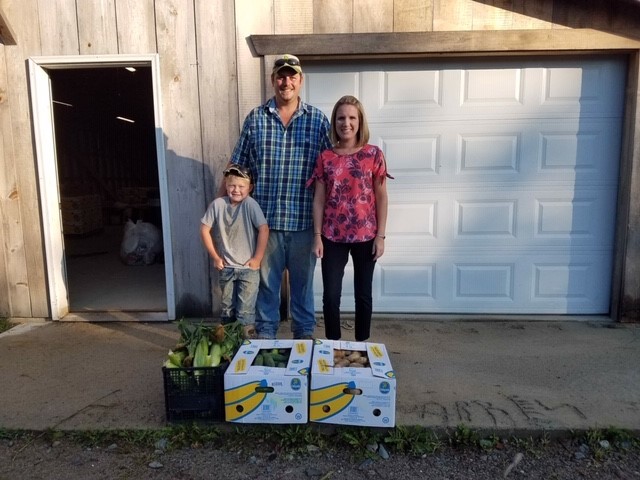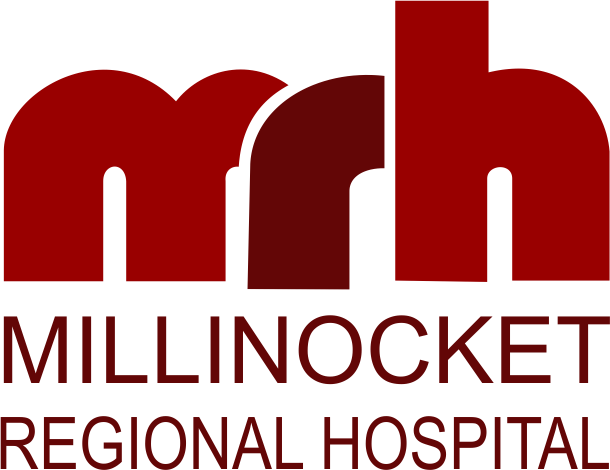Mainers Feeding Mainers connections MRH patients with Jordan produce
By Shelley Farrington Lincoln News • September 5, 2019
KATAHDIN REGION – Like many other regions in Maine, food insecurity (not being able to afford to eat enough nutritionally to maintain a healthy lifestyle) is a way of life for many families in the Katahdin area.
A community needs assessment conducted by Thrive Penobscot, a grant funded community coalition based out of Millinocket Regional Hospital that works to improve the wellbeing of residents in the region, and the University of Maine Center on Aging, confirmed that hunger is an issue with residents in the region.
In addition, the assessment also made it clear that the stigma of food insecurity keeps some people from reaching out for help and accepting assistance. To help combat that stigma and reduce hunger in the region MRH has partnered with Good Shepherd Food Bank (GSFB) in its “Mainers Feeding Mainers” initiative.
Every week during the growing season fresh produce from Jordan Farms in Chester is delivered to MRH family medicine and primary care offices for patients at those practices. Patients are encouraged to help themselves to supplement their nutritional needs with no questions asked. If someone takes food all that is asked is that they leave a check mark on a tally sheet so that MRH can report back to GSFB as to how many people are participating in the Mainer’s Feeding Mainer’s program.
Cheryl Carrell, RN and Diabetes Educator at MRH said her patients are excited about the produce although some are tentative to take it. She said she’s found if she puts some food together and gives it to them before they leave then they gladly accept. Carrell said the program is great and the produce is welcomed as a great nutritional option.
Greg Jordan of Jordan Farms said he is pleased to be able to send food to MRH and has been participating in the Mainers Feeding Mainers program with GSFB for four years. Ashley Cox, a nurse navigator at MRH, stops into the farm every Tuesday morning to pick up the load for the week so the food is as fresh as it can be.
Jordan said he has a special affinity for GSFB because as a laid of mill worker in 2014 he suddenly found himself the recipient of food generously provided by the Good Shepherd mobile food truck. He understands how difficult it is to ask for and accept help and as soon as he was able he wanted to give back.
“In the spring of 2015 I decided I wanted to make a go of farming full time,” Jordan said, “I loved it and that year we had a bumper crop of potatoes and squash. I remembered how Good Shepherd was there for us and I contacted them. We’ve been working with them ever since.”
Jordan applauded the efforts of Cox and Thrive Penobscot Director Jane Danforth because it’s takes effort to make these programs happen and to try and fill a need in a community. He said it works because of the “energy that’s put into it.”
Last year Jordan said he was able to send produce to MRH all the way into November and he’s hoping to do the same this year.
Danforth said based on the feedback the hospital has received the patients and providers like the program and working with a local farm to make it happen. Last year with Good Shepherd’s help over 2,400 pounds of fresh produce from Jordan’s was made available.
MRH providers have screened patients for hunger and food insecurity in 2016, Danforth said, and its enabled providers and patients to have conversations about the importance of eating well, available resources and reducing the stigma. And being able to work with a local family farm provides a win/win for both the patient and farmer.
I tell people that ‘food is medicine,’” Danforth said, “and you need to eat well to be well. Hunger is a real health issue and I’m pleased that MRH is providing fresh produce on site through this program. It’s a win/win for both the patient and farmer.”

Mainers feeding Mainers – Chester farmer Greg Jordan, with the help of his six-year old son Warren, helped MRH nurse navigator Ashley Cox load fresh produce in her car for transport to MRH last Tuesday. Cox helps transport fresh produce from Jordan’s every week during the growing season to MRH’s Primary Care and Family Medicine Offices for their patients supplemental nutrition needs. Jordan’s has partnered with Good Shepherd Food Bank and the Mainers Feeding Mainers program for four years. (Contributed photo)
